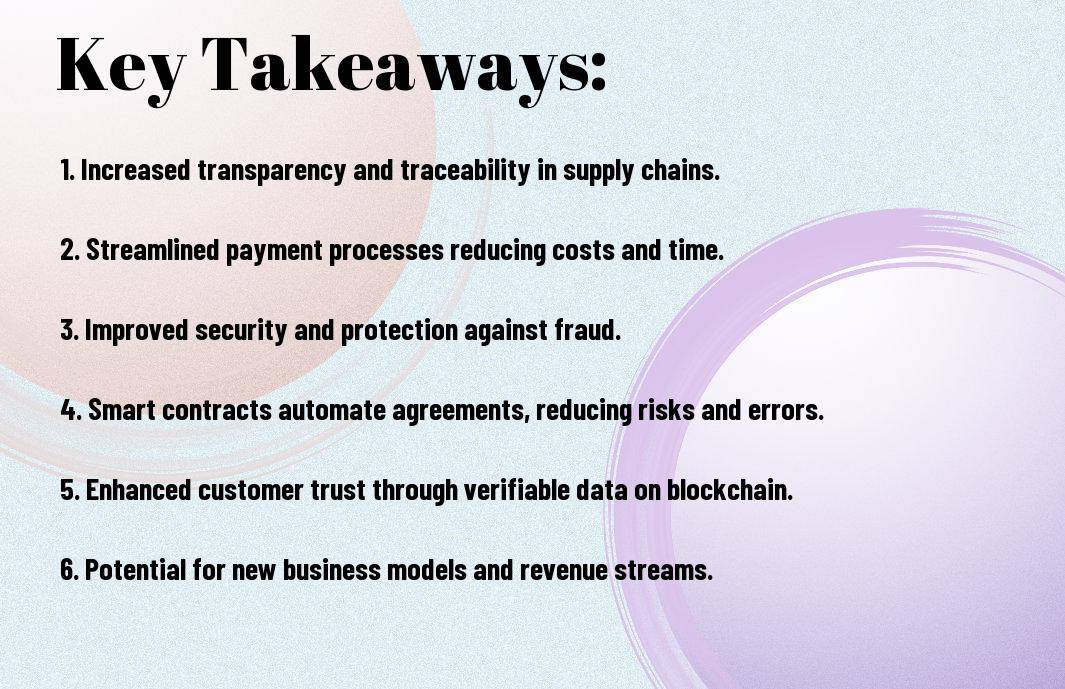
Newsletter Subscribe
Enter your email address below and subscribe to our newsletter

Enter your email address below and subscribe to our newsletter

Blockchain in Business and Digital Ledgers! You may have heard about blockchain technology in the context of cryptocurrencies like Bitcoin, but its potential reaches far beyond digital currencies. Blockchain is transforming the way businesses operate by providing a secure, transparent, and decentralized digital ledger system. In this blog post, we will explore how companies across various industries are leveraging blockchain to streamline operations, enhance security, and foster trust among stakeholders.


Some How your business can leverage blockchain technology has revolutionized the way businesses operate by introducing a secure and transparent method for recording transactions. Blockchain is a distributed ledger technology that stores data in blocks, linked together in a chronological chain. This technology ensures that all transactions are secure, immutable, and transparent.
With the rise of blockchain technology, companies are exploring ways to leverage digital ledgers to streamline their operations. Digital ledgers are electronic records that are stored in a decentralized manner, making them resistant to tampering or fraud. This technology allows for real-time tracking of transactions, increased efficiency, and reduced costs for businesses.
Assume that blockchain technology ensures that all transactions are secure and transparent, providing a reliable and efficient way to conduct business.
Blockchain technology has the potential to revolutionize various industries by offering a secure and efficient way to record and track transactions. With its decentralized nature and cryptographic security features, blockchain technology provides a level of trust and transparency that traditional systems lack. This technology has the power to streamline processes, reduce costs, and improve the overall efficiency of businesses.
The most important aspect of blockchain technology is its decentralized nature, which eliminates the need for a central authority and reduces the risk of fraud or manipulation. The dangerous aspect lies in the potential for data breaches if proper security measures are not in place. On the positive side, blockchain technology offers unparalleled transparency and security, paving the way for a new era of digital trust.

On the forefront of the business value of blockchain is its ability to establish trust and enhance integrity in business transactions. By providing an immutable and transparent ledger, blockchain ensures that all parties involved in a transaction can trust the authenticity of the information being exchanged.
Transactions on blockchain networks can lead to a significant reduction in transaction costs and complexity. It eliminates the need for intermediaries and streamlines processes by providing a secure and direct channel for peer-to-peer transactions.
It enables companies to conduct business more efficiently and at a lower cost, ultimately improving profit margins and operational efficiency. With smart contracts automating various steps of a transaction, companies can save time and resources that would have been spent on manual processes.
Many businesses are turning to blockchain technology to streamline their supply chain management processes. Blockchain offers a transparent and immutable ledger that can track the movement of goods from the point of origin to the final destination. Smart contracts can be used to automate various tasks such as inventory management, order processing, and payment verification, reducing the risk of errors and fraud.
An increasing number of companies are utilizing automation in the form of smart contracts to execute predefined actions automatically when certain conditions are met. These self-executing contracts run on the blockchain and eliminate the need for intermediaries, saving time and reducing costs. Smart contracts and automation enhance trust and security in business transactions, as all parties can verify information on a shared ledger in real time.
Blockchain technology enables the creation of smart contracts that automatically enforce the terms of a contract, ensuring that agreements are executed as intended without the need for human intervention.
Blockchain is revolutionizing the way payments and cross-border transactions are conducted by providing a decentralized and secure method for transferring funds. Businesses can benefit from faster, cheaper, and more transparent transactions by utilizing blockchain technology. Another advantage of blockchain in payments is the ability to eliminate intermediaries, reducing processing times and fees.
Payments and Cross-Border Transactions conducted on the blockchain are more secure and efficient, offering greater traceability and lower risk of fraud or errors.

Now, one of the major challenges hindering widespread adoption of blockchain technology is scalability. The current blockchain infrastructure, particularly in public blockchains like Bitcoin and Ethereum, faces limitations in processing speed and transaction throughput. As the number of users and transactions increases, these networks experience congestion and slower processing times, making it inefficient for use in large-scale business applications.
The challenges related to interoperability between different blockchains are also significant in the blockchain ecosystem. Interoperability refers to the ability of different blockchain networks to communicate and transact with each other seamlessly. Currently, many blockchains operate in silos, making it difficult for them to exchange data and value. This lack of interoperability restricts the potential for blockchain to revolutionize industries by limiting the efficiency and effectiveness of decentralized applications.
Challenges in achieving interoperability include differences in protocol standards, consensus mechanisms, and data formats across various blockchain platforms. Efforts are underway to develop solutions such as cross-chain communication protocols and interoperability standards to bridge these gaps and enable a more connected blockchain ecosystem.
Understanding the legal and regulatory landscape surrounding blockchain technology is crucial for businesses looking to integrate it into their operations. Legal and regulatory considerations encompass a range of issues, including data privacy, intellectual property rights, smart contract enforceability, and compliance with anti-money laundering (AML) and know your customer (KYC) regulations.
Issues such as jurisdictional differences in laws and regulations, uncertain legal status of cryptocurrencies, and evolving regulatory frameworks present challenges for companies navigating the complex legal environment of blockchain technology. It is important for businesses to seek legal counsel and stay informed about the latest developments in regulations to ensure compliance and mitigate legal risks.
After exploring how companies are currently leveraging blockchain technology, the future of this revolutionary technology in business holds even more exciting prospects. As outlined in the post on Blockchain Marketing: Leveraging the Power of Distributed Ledgers for Business Success, there is a growing interest in utilizing blockchain for marketing purposes. Companies are realizing the potential of blockchain in enhancing trust, transparency, and security in their marketing efforts.
To stay competitive in this rapidly evolving landscape, businesses need to keep abreast of the latest trends in blockchain technology. Some key trends include the rise of decentralized finance (DeFi), Non-Fungible Tokens (NFTs), and the integration of blockchain with Internet of Things (IoT) devices. These developments have the potential to revolutionize various industries and create new opportunities for growth and innovation.
Integration of blockchain technology is set to disrupt various industries, including finance, healthcare, supply chain management, and real estate. As blockchain continues to gain traction, we can expect to see increased efficiency, reduced costs, and improved security in these sectors. Companies that embrace blockchain early on stand to benefit from enhanced trust among consumers, streamlined processes, and new revenue streams. It is crucial for businesses to stay ahead of the curve and explore ways to integrate blockchain into their operations to remain competitive in the digital economy.
The future of blockchain in business is bright, with the technology offering unprecedented opportunities for companies to innovate and transform their operations. By staying informed about the latest trends and predictions for blockchain disruption, businesses can position themselves for success in the evolving landscape of digital ledgers.
Not every business process is suitable for blockchain integration. Identifying the right opportunities for blockchain implementation is crucial for success. Look for areas in your business where transparency, security, and decentralization are paramount. Supply chain management, identity verification, smart contracts, and data sharing are common areas where blockchain can bring significant benefits.
To ensure a successful blockchain project, businesses need to follow a structured approach. Defining the project scope, setting clear objectives, selecting the right blockchain platform, and identifying key performance indicators are imperative steps in the process. Collaborating with blockchain experts or consultants can help navigate the complexity of implementing this technology.
Execute a pilot project to test the efficacy of the blockchain solution before full-scale implementation. For instance, you can start with a small-scale implementation in one department or for a specific use case to evaluate its performance and potential impact. Gathering feedback, analyzing results, and making necessary adjustments are critical before scaling up the project.
Following this exploration of how companies are leveraging digital ledgers through blockchain technology, it is clear that the potential benefits are vast and varied. From supply chain management to finance and beyond, businesses are finding innovative ways to streamline operations, enhance security, and increase transparency.
As blockchain continues to evolve and gain traction in the business world, it will be crucial for companies to stay informed and adapt to these technological advancements in order to remain competitive. By understanding the principles of blockchain and exploring its practical applications, businesses can position themselves to thrive in the digital economy of the future.
A: Blockchain technology is a decentralized, distributed ledger system that securely records transactions across multiple computers in a way that is transparent, tamper-proof, and efficient.
A: Businesses are leveraging blockchain technology to streamline operations, enhance security, create trust among stakeholders, reduce costs, and enable new business models.
A: Some key benefits of using blockchain in business include increased transparency, enhanced security, improved traceability, reduced fraud, and lower operational costs.
A: Blockchain can improve supply chain management by providing real-time visibility into the movement of goods, enabling faster transactions, reducing paperwork, and ensuring authenticity and quality of products.
A: Yes, blockchain technology is highly secure due to its decentralized nature, cryptographic algorithms, and consensus mechanisms that make it nearly impossible for hackers to manipulate or tamper with the data stored on the blockchain.
A: Companies are using blockchain for digital identity management to securely store and manage customer identities, prevent identity theft, streamline user authentication processes, and comply with data protection regulations.
A: Industries such as finance, healthcare, supply chain, real estate, logistics, and entertainment are adopting blockchain technology to drive innovation, improve efficiency, and enhance security in their business operations.